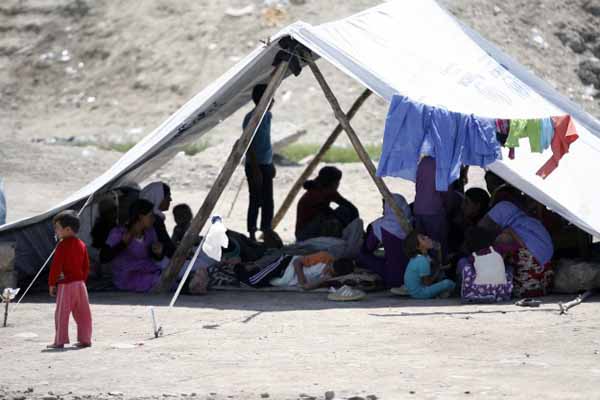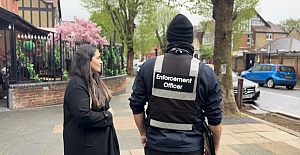"We couldn't express our faith publicly earlier but now we can... We don't feel ourselves under pressure in Turkey anymore," says Yusuf Tahey, 66, a retired local mayor in the southeastern Turkish province of Batman. This Kurdish ethnic minority, which stretches across into northern Iraq, have hit the headlines after being targeted by the militant group Islamic State. Thousands of Ezidi people have fled their homes and villages, with many being stranded on Sinjar Mountain in northern Iraq without food and water. Since June, IS has reportedly killed hundreds of Ezidis in Iraq and, according to Iraq’s human rights minister, Mohammed Shia al-Sudani, have buried some alive, including women and children. Ezidis say they have faced centuries of persecution because of their religion. Many Ezidis fleeing from the war in Iraq are also waiting for shelter on the border with Turkey, according to some reports. More than 300 Iraqi Ezidis were given shelter in a tent city in the southeastern Turkish province of Mardin two weeks ago.
According to Mardin municipality, their numbers have now reached 3,600; however, the numbers change every day.
Estimates put the total Ezidi population across the world at approximately 700,000 people. They are concentrated in northern Iraq, in and around Sinjar -- their traditional home -- but also live in countries like Syria and Turkey.
Turkey has estimated 300 Ezidi residents -- without including numbers of recent refugees. They live in towns near the southern Turkish cities of Sanliurfa, Batman, Mardin and Diyarbakir close to the Syrian border.
Their numbers were around 80,000 in the 1970s; since then the majority of Ezidis have migrated from Turkey to Europe, especially in the 1980s, mixed up in the wave of Turkish emigration to Germany.
"When I went into the army to perform my military service in Turkey, nobody knew that I am an Ezidi. I couldn't tell them in order not to be excluded by them," says another Ezidi resident, Ihsan Bas, 62, who is a farmer in Batman.
"Compared to other countries like Iraq [before the Islamic State], it is much more easy to live here. People in Turkey are much more tolerant of us," says Bas.
"We were hiding our identity 35, 40 years ago. But we don't hide it now," says Alaattin Kartal, 62, another resident, who is a farmer in Batman.
"We have neighbors who are Muslims. We visit each other. We don't have any problem with them. Some people accept us as if we are their own brothers."
Hikmet Yuksel, 39, a representative for an organization called 'Ezidis Unity' thinks that there are still some pressure in Turkey but they are relatively less, compared to previous years.
"There are some people, who are much more tolerant of us but some of them are not ... For example, there are some forbidden words in our belief [like devil]. Some people use these deliberately to humiliate us," Yuksel says.
Ezidis believe in God and seven angels, the leader of which is named 'Malak Tawous.' Malak Tawous is regarded as a devil in Islam as it disobeyed God’s command to bow down to Adam, earning Ezidis an undeserved reputation 'devil worshippers.'
Their religion -- which is thought to have been founded in the 11th century -- fuses Zoroastrian, Manichaean, Jewish, Nestorian Christian and Islamic elements. Many Islamic scholars regard Ezidi beliefs as 'heretical.'
Ezidi residents blame these religious prejudices for the murderous attacks on their communities by the Islamic State.
"The reason for the attacks on Ezidis is that we are a minority and some people who follow dominant religions want to convert us to their religions," Yuksel says.
This ancient community has suffered much but are determined to retain their identity in an often-hostile region.
"We are very faithful people. We prefer to die but we will not abandon our religion," says Ihan Bas.


 Prime Minister Keir Starmer's 2025 Easter message
Prime Minister Keir Starmer's 2025 Easter message After Nesil Caliskan a by-election will be held in Jubilee ward in Enfield
After Nesil Caliskan a by-election will be held in Jubilee ward in Enfield Publishing the analysis, Labour’s Cllr Ergin Erbil said Everybody in Enfield deserves basic rights
Publishing the analysis, Labour’s Cllr Ergin Erbil said Everybody in Enfield deserves basic rights Gaza-Israel conflict Statement from Cllr Ergin Erbil, Leader of Enfield Council
Gaza-Israel conflict Statement from Cllr Ergin Erbil, Leader of Enfield Council UK AMBASSADOR TO TURKEY VISITS FETHIYE
UK AMBASSADOR TO TURKEY VISITS FETHIYE Journalists from Europe held the Turkish Media Workshop in Skopje
Journalists from Europe held the Turkish Media Workshop in Skopje The European Union called on Turkey to uphold democratic values
The European Union called on Turkey to uphold democratic values Turkish citizens in London said Rights, Law, Justice
Turkish citizens in London said Rights, Law, Justice The 'Prince of Paris' has impressed in his first EuroLeague season
The 'Prince of Paris' has impressed in his first EuroLeague season Saran Media And Euroleague Basketball Extend Media Rights Partnership for Four More Years
Saran Media And Euroleague Basketball Extend Media Rights Partnership for Four More Years Will Rangers be Jose Mourinho’s next victim?
Will Rangers be Jose Mourinho’s next victim? Jose Mourinho's Fenerbahce face Rangers on Thursday
Jose Mourinho's Fenerbahce face Rangers on Thursday Residents welcomed back to Edmonton Leisure Centre
Residents welcomed back to Edmonton Leisure Centre Barclays has become the biggest UK lender so far to cut mortgage rates
Barclays has become the biggest UK lender so far to cut mortgage rates THE SPRING STATEMENT EXPLAINED, UK ECONOMIC OUTLOOK AND GROWTH FORECASTS
THE SPRING STATEMENT EXPLAINED, UK ECONOMIC OUTLOOK AND GROWTH FORECASTS Launch of Made in Enfield gift shop to celebrate local artists and designers
Launch of Made in Enfield gift shop to celebrate local artists and designers


















